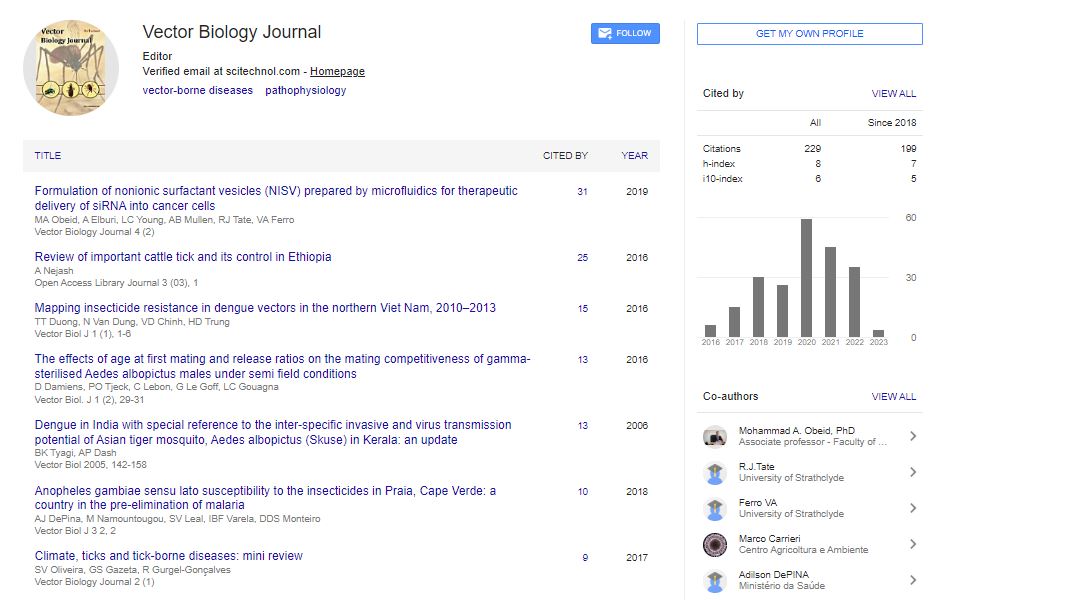Short Communication, Vector Biol Vol: 8 Issue: 1
Dengue Fever: Causes, Symptoms, Treatment, and Prevention
Huang Kuan*
1Department of Chemistry, Hong Kong University of Science and Technology, Clear Water Bay, Hong Kong
*Corresponding Author: Huang Kuan
Department of Chemistry, Hong Kong
University of Science and Technology, Clear Water Bay, Hong Kong
E-mail: Huangkuan@123.com
Received date: 20-Feb-2023, Manuscript No. VBJ-23-93742;
Editor assigned date: 22-Feb-2023, PreQC No. VBJ-23-93742 (PQ);
Reviewed date: 09-Mar-2023, QC No VBJ-23-93742;
Revised date: 16-Mar-2023, Manuscript No. VBJ-23-93742 (R);
Published date: 23-Mar-2023, DOI: 10.4172/2473-4810.1000256.
Citation: Kuan H (2023) Dengue Fever: Causes, Symptoms, Treatment, and Prevention. Vector Biol 8:1.
Description
Dengue fever is caused by any one of the four types of dengue viruses, which are transmitted to humans by infected mosquitos. When a mosquito carrying the virus bites a person, the virus enters the bloodstream dengue fever cannot be contracted through direct contact with an infected person [1-3]. Almost half of the world's population around 4 billion people live in areas with a risk of dengue fever. Febrile phase, critical phase, and recovery phase. The febrile phase usually lasts for the first three to seven days and is characterized by a sudden high-grade fever of around 40°C (104°F), headache, joint and muscle pain, and a rash. The important phase can occur in some cases, particularly in dengue hemorrhagic fever or dengue shock syndrome, and is marked by plasma leaking, fluid accumulation, respiratory distress, severe bleeding, and organ impairment [4,5]. The recovery phase follows the critical phase and is marked by the resolution of symptoms. When a person has dengue, the platelet count can fall below 1.5 lakh, which is lower than the normal platelet count range of 1.5 to 4 lakhs in a healthy person. However, reports a platelet count of 276,000 in a case where there was no thrombocytopenia, which means that not all dengue cases will have low platelet count [6-8]. Nonetheless, states that about 80 to 90 per cent of patients with dengue fever will have platelet counts below the normal range. Therefore, while a low platelet count is a common finding in dengue fever, it is not present in all cases and the extent of the decrease can vary.
Clinical manifestation
Dengue fever is characterized by a range of clinical manifestations that can vary from mild to severe. The common symptoms include headache, muscle and joint pain, nausea, vomiting, pain behind the eyes, and rash. In some cases, the patient may also experience retroorbital pain, swollen glands, and bleeding manifestations such as petechiae, epistaxis, gum bleeding, hematemesis, and others [9]. Management of dengue fever involves adequate hydration, pain relief with paracetamol, and close monitoring of the patient's condition for signs of plasma leakage or organ impairment. In severe cases, hospitalization may be required, and the patient may need intravenous fluid therapy or blood transfusion. Early detection and prompt medical intervention are crucial for the successful management of dengue fever there is no specific medicine to treat dengue fever. The focus of treatment is on managing the symptoms and preventing complication. Over-the-counter pain relievers such as aspirin, ibuprofen, and naproxen should be avoided, as they can increase the risk of bleeding. Acetaminophen (paracetamol) is often used to control the fever and pain associated with dengue fever [10]. Adequate hydration is also essential, and patients should drink plenty of fluids to avoid dehydration. In severe cases, hospitalization may be required, and the patient may need intravenous fluid therapy or blood transfusion. While the symptoms of dengue fever can be uncomfortable, they usually resolve within a week or so without any lasting complications severe dengue, on the other hand, is a potentially life-threatening complication that can develop in some cases of dengue fever [11]. It is characterized by plasma leakage, fluid accumulation, respiratory distress, severe bleeding, and organ impairment. Severe dengue requires prompt medical attention and aggressive treatment to prevent complications and death while dengue fever is generally a self-limiting illness, severe dengue is a serious complication that requires immediate medical intervention.
References
- Idrees S, Ashfaq UA (2012) A brief review on dengue molecular virology, diagnosis, treatment and prevalence in Pakistan. Genetic vaccines and therapy 10:1-0. [Crossref]
- Amarasinghe A, Kuritsky JN, Letson GW, Margolis HS (2011) Dengue virus infection in Africa. Emerging infectious diseases 17(8):1349.
- Shuaib W, Stanazai H, Abazid AG, Mattar AA (2016) Re-emergence of Zika virus: A review on pathogenesis, clinical manifestations, diagnosis, treatment, and prevention. Am J Med 129(8):879-e7.
- Ooi EE, Gubler DJ (2009) Dengue in Southeast Asia: Epidemiological characteristics and strategic challenges in disease prevention. Cadernos de saude publica 25:S115-24.
- Kautner I, Robinson MJ, Kuhnle U (1997) Dengue virus infection: Epidemiology, pathogenesis, clinical presentation, diagnosis, and prevention. J Pediatr 131(4):516-524.
- Khetarpal N, Khanna I (2016) Dengue fever: Causes, complications, and vaccine strategies. J Immunol Res.
- Itrat A, Khan A, Javaid S, Kamal M, Khan H, et al (2008) Knowledge, awareness and practices regarding dengue fever among the adult population of dengue hit cosmopolitan. PloS one 3(7):e2620.
- Roy SK, Bhattacharjee S (2021) Dengue virus: Epidemiology, biology, and disease aetiology. Can J Microbiol 67(10):687-702.
- Muller DA, Depelsenaire AC, Young PR (2017) Clinical and laboratory diagnosis of dengue virus infection. J Infect Dis. 215:S89-95.
- Sood SK, Sood V, Mahajan I (2021) An intelligent healthcare system for predicting and preventing dengue virus infection. Computing 8:1-39.
- Yauch LE, Shresta S (2008) Mouse models of dengue virus infection and disease. Antivir Res 80(2):87-93.
 Spanish
Spanish  Chinese
Chinese  Russian
Russian  German
German  French
French  Japanese
Japanese  Portuguese
Portuguese  Hindi
Hindi 